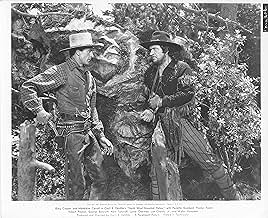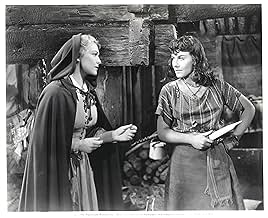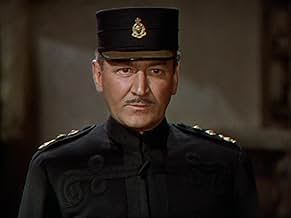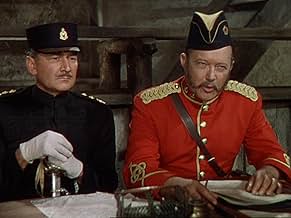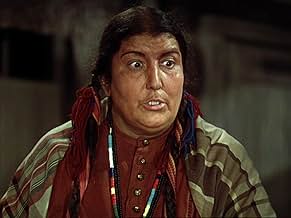CALIFICACIÓN DE IMDb
6.3/10
2 k
TU CALIFICACIÓN
En 1885, un ranger de Texas viaja a Canadá para arrestar a un cazador buscado por asesinato y que está incitando a los nativos a una rebelión contra el gobierno canadiense.En 1885, un ranger de Texas viaja a Canadá para arrestar a un cazador buscado por asesinato y que está incitando a los nativos a una rebelión contra el gobierno canadiense.En 1885, un ranger de Texas viaja a Canadá para arrestar a un cazador buscado por asesinato y que está incitando a los nativos a una rebelión contra el gobierno canadiense.
- Dirección
- Guionistas
- Elenco
- Ganó 1 premio Óscar
- 4 premios ganados y 4 nominaciones en total
Opiniones destacadas
this first demille color epic was a sensation in 1940, deep in the era of fitzpatrick traveltalks ("so as the sun sinks slowly behind the rugged rockies we bid a reluctant adieu to the friendly metis people of canada.") it surely has many fine moments. but the plot is somewhat convoluted and the hero keeps picking up different horses along the way. "the horse he rode in on" was 1500 miles from home (texas). we see a somewhat distorted map of canada at the opening. the pivotal town of batoche is situated too close to the US border, about where regina should be. regina isn't shown, despite continual reference to it throughout. demille isn't the best director for gary cooper, who was allowed to brandish his bizarre mannerisms in a duel to the finish with paulette goddard. the cool blonde madeleine carroll and stout fella preston foster were pleasant to see, but best acting was done by george bancroft as the heartless whiskey runner, jacques corbeau. best lines include one by montagu love as the mortally wounded inspector cabot: some fool at headquarters wants to change the uniform to green. stand up for the redcoats! it's a good color. and another colonialism from foster as sgt. brett to an indian chief: will big bear kneel to the queen and be chief of his people again? it was a valiant two hour fight, but the scenery won. bonus quote by lynne overman as scottish-indian todd macduff: do they have fast horses in texas, mr. rivers? i'm bettin' they can nae keep up wi' the men.
The master of spectacle doesn't let us down in that regard with his first movie shot in Technicolor.The action sequences are as exciting as in other De Mille spectacles but the hammy acting,the ridiculous dialog and slow pacing makes this a below par movie for De Mille. Gary Cooper and Madeleine Carroll look embarrassed throughout speaking those silly lines.Preston Foster as the third party of the love triangle has one of his more substantial parts in his career.But it is fun to watch Paulette Goddard's hilarious overacting.As her villainous father George Bancroft isn't far behind in that department.The best acting are provided by the two veterans Akim Tamiroff and Lynne Overman who provide some comic relief.The movie is beautiful to look at in bright colors and passes the afternoon quite painlessly.
One of several idiosyncratic inclusions in that silly book, 'The Fifty Worst Movies of All Time', DeMille's first film in full Technicolor is actually good fun; and adroitly exploits his new toy by filling the screen with Mounties' red uniforms (one of them worn by a fleetingly glimpsed young Robert Ryan).
Starring Gary Cooper as the delightfully named Dusty Rivers, the ladies comprise a rare appearance in colour by the blonde Madeleine Carroll (who describes Coop as "an angel in leather"), visually contrasted with dusky half-Indian wildcat Paulette Goddard (of whom Robert Preston snarls "If your neck wasn't so lovely I'd break it!!).
As usual in a late DeMille all the spectacular outdoor scenes are left in the hands of second-unit director Arthur Rossen; while veteran editor Anne Bauchen's ability to lick this all into coherent shape was acknowledged by the Academy with an Oscar.
Starring Gary Cooper as the delightfully named Dusty Rivers, the ladies comprise a rare appearance in colour by the blonde Madeleine Carroll (who describes Coop as "an angel in leather"), visually contrasted with dusky half-Indian wildcat Paulette Goddard (of whom Robert Preston snarls "If your neck wasn't so lovely I'd break it!!).
As usual in a late DeMille all the spectacular outdoor scenes are left in the hands of second-unit director Arthur Rossen; while veteran editor Anne Bauchen's ability to lick this all into coherent shape was acknowledged by the Academy with an Oscar.
You first have to understand that DeMille has taken considerable poetic licence, while using the story of the return of Louis Riel to Canada, and the subsequent Duck Lake massacre of a large unit of Mounties. Even the pronunciation by DeMille of the word "Metis" at the introduction to the movie is quite incorrect.
Fun to watch the fictional introduction of Gary Cooper as a Texas marshal travelling into Canada in pursuit of a Metis criminal.
Some good aspects of the film include the historical accuracy of the uniforms at that time... no wide brimmed hats... and the correctness of the name of the Mounties at that time. The only item of historical inaccuracy is the fur hats that DeMille has the Mounties wear. During the warmer weather they wore either a pill box hat or a white helmet. They did wear fur hats during the winter with their Buffalo hide coats, but DeMille did not like the design of any of the head wear that was part of the actual uniform, so he had this design made for the picture.
The two key bad guys are historical fact, although whether they acted as they are shown in the movie is another question. Whether there was a gatling gun at the Duck Lake massacre is another question the historians will have to answer.
Generally, a good romp... a great movie to sit back and watch with popcorn and a soft drink.
Fun to watch the fictional introduction of Gary Cooper as a Texas marshal travelling into Canada in pursuit of a Metis criminal.
Some good aspects of the film include the historical accuracy of the uniforms at that time... no wide brimmed hats... and the correctness of the name of the Mounties at that time. The only item of historical inaccuracy is the fur hats that DeMille has the Mounties wear. During the warmer weather they wore either a pill box hat or a white helmet. They did wear fur hats during the winter with their Buffalo hide coats, but DeMille did not like the design of any of the head wear that was part of the actual uniform, so he had this design made for the picture.
The two key bad guys are historical fact, although whether they acted as they are shown in the movie is another question. Whether there was a gatling gun at the Duck Lake massacre is another question the historians will have to answer.
Generally, a good romp... a great movie to sit back and watch with popcorn and a soft drink.
Cecil B. DeMille's fame as a leading movie director is still secure because of his innovative nature. He certainly developed spectacle movies, and even today he is remembered as the pioneer. But that does not blind us to his flaws. His characters are not three dimensional usually but black or white in personality. His dialog is for the birds. He does fall into stereotypes too often. It is understandable that the Medveds included "Northwest Mounted Police" among the 50 worst movies ever made.
Yet one can't easily dismiss it. It was DeMille's first color movie. It was the second of four films with Gary Cooper, one of four made Goddard and one of three made with Robert Preston. Preston made good action films in this period but was always in support. In the early 1950s he returned to the stage and the fame that eluded him in Hollywood. Came "The Music Man", "The Lion In Winter", and "Mack and Mabel" and the recognition of Preston the adept entertainer. Came the call back to Hollywood for his filmed performances as Harold Hill and Toddy (in "Victor/Victoria"). Preston was that rarity: an actor who proved his star qualities in middle-age. DeMille would never have been his kind of director: he had no light touch for comedy, and he did not do musicals. Still, for some good straight performances as doomed weaklings, Preston did well in this film,"Union Pacific", and "Reap the Wild Wind".
The film's historic content is interesting. DeMille's earlier historic films ("Cleopatra", "Sign of the Cross", "The Crusades") dealt with old world history. But after the last DeMille concentrated on American history with "The Plainsman", "The Buccaneer", "Union Pacific", "Reap The Wild Wind", and "The Unconquered". Even the modern "The Story of Dr. Wassell" was based on a true tale connected with the current war in the Pacific.
Because of his American History period "Northwest Mounted Police" is an odd film. Cooper's character is the only link in it to American history in the 1880s, as a Texas Ranger after George Bancroft (Le Corbeau) for murder. The film is set firmly in Canada which was the scene of two revolts of the Metis people under Louis Riel in 1870 and 1885. As such this becomes somewhat unique among the historic films of Hollywood.
Canada does poorly regarding it's history in Hollywood. This movie actually covers one of the most troubling moments of modern Canadian history: the fate of Louis Riel. We don't know about it down here. Riel was a lawyer and teacher with some mental problems. Riel helped found the provinces of Manitoba and Saskatchewan, thus making him one of Canadian history's founding fathers. But he was also aware that French Canadians and his Metis people got a suspiciously short deal from the British Canadians in Canada. Canada was firmly controlled by the Tory party led by Sir John MacDonald. MacDonald was corrupt but made one of the great comebacks in political history in 1879. Riel had led a revolt in 1870 which was crushed. He fled to the U.S., and spent some time in asylums here. He was released, taught school in Montana, and then returned to Canada (illegally) in 1884. He organized a second Metis revolt, which nearly succeeded in winning an independent state. A British army crushed it in 1885, captured Riel, and he was tried for treason.
Lives had been lost, and property destroyed. MacDonald's son had been sent to Manitoba to run the province, and he had been humiliated by the revolt. Riel, however, had some legitimate gripes about the treatment of French Canadians, and the Metis. The treason trial came, and he was found guilty. MacDonald apparently never had a moment's hesitation about what to do. He refused to stop Riel's execution. The Tory Party in Canada has never recovered from this mistake. The backbone of Liberal Party strength (to the current day) is French Canadien Quebec - they have never forgiven the Tories for not acting humanely to Louis (and putting him in a Canadian asylum for life).
DeMille is not totally anti-Riel. Riel is not unlike the American John Brown (inthe contemporary film "Santa Fe Trail"), who is murderous and possibly insane but fighting for certain principles that actually get the audience's sympathy. In this film, Riel is committed to a Metis revolt and state and he will stop at nothing to prevent it's success. But he also is shown as a kindly man to young children (he was a school teacher, remember).He is trying to save a way of life that a juggernaut threatens. And he is resigned to his fate at the end, realizing that in dying he may still win (which happened). We need a subsidiary villain like Van Heflin in "Sante Fe Trail" who is villainous for money. Here it is Bancroft, a murderer and criminal who is Riel's assistant. His villainy is passed down through his genes to his daughter (Goddard) who tempts and betrays Preston. One wonders, had Riel formed a successful government and state, how long before Le Corbeau would have arranged an "accident" or "assassination" (by a "Tory" agent, of course) of Riel, in order to cement his control over the Metis nation. So when he gets his just deserts at the end, unlike poor Louis, we are cheered by it. One has to congratulate DeMille in trying to be fair to Louis, when he could have just made his a super villain.
Yet one can't easily dismiss it. It was DeMille's first color movie. It was the second of four films with Gary Cooper, one of four made Goddard and one of three made with Robert Preston. Preston made good action films in this period but was always in support. In the early 1950s he returned to the stage and the fame that eluded him in Hollywood. Came "The Music Man", "The Lion In Winter", and "Mack and Mabel" and the recognition of Preston the adept entertainer. Came the call back to Hollywood for his filmed performances as Harold Hill and Toddy (in "Victor/Victoria"). Preston was that rarity: an actor who proved his star qualities in middle-age. DeMille would never have been his kind of director: he had no light touch for comedy, and he did not do musicals. Still, for some good straight performances as doomed weaklings, Preston did well in this film,"Union Pacific", and "Reap the Wild Wind".
The film's historic content is interesting. DeMille's earlier historic films ("Cleopatra", "Sign of the Cross", "The Crusades") dealt with old world history. But after the last DeMille concentrated on American history with "The Plainsman", "The Buccaneer", "Union Pacific", "Reap The Wild Wind", and "The Unconquered". Even the modern "The Story of Dr. Wassell" was based on a true tale connected with the current war in the Pacific.
Because of his American History period "Northwest Mounted Police" is an odd film. Cooper's character is the only link in it to American history in the 1880s, as a Texas Ranger after George Bancroft (Le Corbeau) for murder. The film is set firmly in Canada which was the scene of two revolts of the Metis people under Louis Riel in 1870 and 1885. As such this becomes somewhat unique among the historic films of Hollywood.
Canada does poorly regarding it's history in Hollywood. This movie actually covers one of the most troubling moments of modern Canadian history: the fate of Louis Riel. We don't know about it down here. Riel was a lawyer and teacher with some mental problems. Riel helped found the provinces of Manitoba and Saskatchewan, thus making him one of Canadian history's founding fathers. But he was also aware that French Canadians and his Metis people got a suspiciously short deal from the British Canadians in Canada. Canada was firmly controlled by the Tory party led by Sir John MacDonald. MacDonald was corrupt but made one of the great comebacks in political history in 1879. Riel had led a revolt in 1870 which was crushed. He fled to the U.S., and spent some time in asylums here. He was released, taught school in Montana, and then returned to Canada (illegally) in 1884. He organized a second Metis revolt, which nearly succeeded in winning an independent state. A British army crushed it in 1885, captured Riel, and he was tried for treason.
Lives had been lost, and property destroyed. MacDonald's son had been sent to Manitoba to run the province, and he had been humiliated by the revolt. Riel, however, had some legitimate gripes about the treatment of French Canadians, and the Metis. The treason trial came, and he was found guilty. MacDonald apparently never had a moment's hesitation about what to do. He refused to stop Riel's execution. The Tory Party in Canada has never recovered from this mistake. The backbone of Liberal Party strength (to the current day) is French Canadien Quebec - they have never forgiven the Tories for not acting humanely to Louis (and putting him in a Canadian asylum for life).
DeMille is not totally anti-Riel. Riel is not unlike the American John Brown (inthe contemporary film "Santa Fe Trail"), who is murderous and possibly insane but fighting for certain principles that actually get the audience's sympathy. In this film, Riel is committed to a Metis revolt and state and he will stop at nothing to prevent it's success. But he also is shown as a kindly man to young children (he was a school teacher, remember).He is trying to save a way of life that a juggernaut threatens. And he is resigned to his fate at the end, realizing that in dying he may still win (which happened). We need a subsidiary villain like Van Heflin in "Sante Fe Trail" who is villainous for money. Here it is Bancroft, a murderer and criminal who is Riel's assistant. His villainy is passed down through his genes to his daughter (Goddard) who tempts and betrays Preston. One wonders, had Riel formed a successful government and state, how long before Le Corbeau would have arranged an "accident" or "assassination" (by a "Tory" agent, of course) of Riel, in order to cement his control over the Metis nation. So when he gets his just deserts at the end, unlike poor Louis, we are cheered by it. One has to congratulate DeMille in trying to be fair to Louis, when he could have just made his a super villain.
¿Sabías que…?
- TriviaCecil B. DeMille initially thought Paulette Goddard was all wrong for the role of the half-breed Indian girl. Marlene Dietrich, Vivien Leigh, Katherine DeMille, Simone Simon, Anna Sten, Olympe Bradna, and Steffi Duna were considered for the part, but when Goddard showed up in his office in costume and make-up speaking pidgin English, he cast her.
- ErroresJust before heading out to find Corbeau, Rivers helps April up onto her wagon. A few minutes later we see her climb up again, on her own.
- Citas
Dusty Rivers: Down where I come from we don't jump to conclusions. It's liable to be a feller's last jump.
- Versiones alternativasThe UK DVD is cut by 6 secs with edits to cruel horsefalls.
- ConexionesFeatured in Cecil B. DeMille: American Epic (2004)
Selecciones populares
Inicia sesión para calificar y agrega a la lista de videos para obtener recomendaciones personalizadas
- How long is North West Mounted Police?Con tecnología de Alexa
Detalles
- Fecha de lanzamiento
- País de origen
- Idioma
- También se conoce como
- North West Mounted Police
- Locaciones de filmación
- Productora
- Ver más créditos de la compañía en IMDbPro
- Tiempo de ejecución2 horas 6 minutos
- Relación de aspecto
- 1.37 : 1
Contribuir a esta página
Sugiere una edición o agrega el contenido que falta

Principales brechas de datos
By what name was Los siete jinetes de la victoria (1940) officially released in India in English?
Responda
